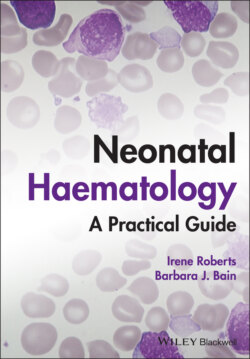Читать книгу Neonatal Haematology - Barbara J. Bain, Irene Roberts - Страница 26
Folic acid and vitamin B12
ОглавлениеIn term and preterm babies of normally nourished mothers, stores of folic acid and vitamin B12 are adequate at birth and are maintained after birth in term neonates.83 However, infants that are breastfed and born to mothers who are vitamin B12 deficient, either due to vitamin B12 malabsorption or because of a strict vegetarian diet, are at high risk of developing severe vitamin B12 deficiency at 4–8 months of life. The prevalence of vitamin B12 deficiency at birth varies in different countries from less than 1 in 100 000 in the USA to 1 in 3000–5000 in European countries where neonatal screening studies have been performed.84–87 Although these infants are asymptomatic in the neonatal period, they develop progressive anaemia and neurological problems over the following months.88 Although the anaemia is rapidly reversible with intramuscular vitamin B12, persistent neurological impairment has been reported,89 leading some to recommend neonatal screening for presymptomatic identification of vitamin B12 deficiency.90 In preterm infants, folic acid reserves are lower at birth and are depleted more quickly than in term neonates, causing deficiency after 2–4 months if the recommended daily intakes are not maintained. The recommended daily intake for folic acid in preterm neonates is 25–100 μg/kg.91 As preterm formula milks and breast milk fortifiers provide sufficient folic acid to prevent folate deficiency in preterm infants,92 further supplementation is not required unless there is chronic haemolysis.
